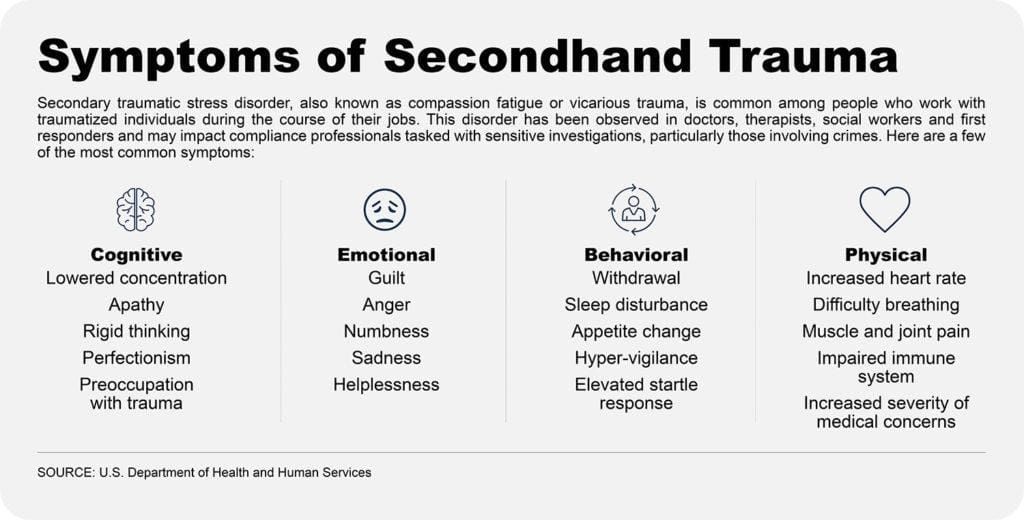First responders, teachers and others who regularly are exposed to cases of violent or sexual crimes generally have dedicated resources to support their mental health and well-being—and rightly so. But what about compliance, ethics, legal, HR, security, privacy, audit and risk professionals? These guardians of integrity within an organization experience the emotional impact of interacting with people who have been harmed or are having the worst experience of their professional lives. Hearing about and investigating such events can be harmful for the investigator, too.
What Is Secondhand Trauma?
According to the U.S. Office for Victims of Crime, secondhand trauma, also referred to as vicarious trauma, “… is an occupational challenge for people working and volunteering …. (when faced with) continuous exposure to victims of trauma and violence. This work-related trauma exposure can occur from such experiences as listening to individual clients recount their victimization; looking at videos of exploited children; reviewing case files; hearing about or responding to the aftermath of violence and other traumatic events day after day.”
The unfortunate reality is that while some of the investigations conducted by “guardian” professionals are decidedly benign, other investigations stem from truly disturbing crimes or egregious ethical violations.
Anybody can feel the effects of this form of trauma if they are exposed to traumatic stories and images, even in the news or on social media, for example. That includes things like repeatedly viewing news footage of world events like the Sept. 11 attacks or Hurricane Katrina or hearing stories from survivors of trauma.
What Are the Signs of Secondhand Trauma?
Secondhand trauma can have many symptoms, though not every individual will exhibit all of them. Symptoms often manifest in cognitive, behavioral, emotional and physical ways, according to the U.S. Department of Health and Human Services.
Research has connected secondhand trauma to symptoms of posttraumatic stress disorder, including in cases such as Holocaust survivors and their children, loved ones of people who survived sexual assault and mental health professionals working with trauma survivors.
 It’s no wonder, then, that for investigators and compliance officers tasked with internal probes on sensitive matters, it can be challenging to avoid negative impacts on their work life. In fact, if unchecked, secondhand trauma can be debilitating.
It’s no wonder, then, that for investigators and compliance officers tasked with internal probes on sensitive matters, it can be challenging to avoid negative impacts on their work life. In fact, if unchecked, secondhand trauma can be debilitating.
The effects of secondhand trauma on workers can impede the work of organizations, leading to increased absenteeism, impaired judgment, low productivity, poor work quality, high staff turnover, greater staff friction and accelerated burnout.
Proactive Techniques to Employ
While secondhand trauma may be impossible to prevent, you can make proactive wellness decisions to cultivate resilience for yourself, your team and your organization.
Strategies for individuals
- Life balance: Work to establish and maintain a diversity of interests, activities and relationships. Your work is only one aspect of who you are.
- Nature therapy: Connect with the outdoors to reduce the impact of stress.
- Creative expression: Find creative outlets like drawing, cooking or photography. If you don’t have a creative side, appreciate the art, music and creative contributions of others.
- Plan for coping: Develop some key metrics of wellness that are personal to you and determine skills and strategies to adopt or enhance when signs of brownout or referred trauma begin to surface.
- Focus on self-care: Maintain a healthy diet, exercise and regular sleep priorities to mitigate adverse stress effects. Try techniques for stress reduction until you find a technique that resonates with you such as loving kindness meditation.
- Seek professional support: Utilize any employee assistance program resources and consider regular interaction with a therapist trained in secondary trauma.
- Recognize your wins: Identifying how you contributed to a better (more equitable) outcome can provide meaning.
Strategies for organizations
- Create a culture (even if it is just within a specific team) that normalizes recognizing the impact that secondary trauma can have on professionals.
- Promote and support self-care.
- Create opportunities for teams to engage in gratitude and philanthropy in support of purpose.
- Provide education about well-being in the workplace to and encourage open discussion about well-being and challenges to well-being within the organization.
- Make counseling resources and employee assistance programs (EAP) available to everyone and regularly discuss how to access resources.



 Lisa Beth Lentini Walker, who began contributing to CCI in 2022 as Well-Being Editor, is the CEO of Lumen Worldwide Endeavors, a firm specializing in compliance, governance and ethics consulting. She is a National Board Certified Health & Wellness Coach (NBC-HWC) and a certified meditation and mindfulness specialist. Lisa Beth has led award-winning legal and compliance departments within large public corporations (including a Fortune 50), privately held enterprises. She does this by strategically aligning resources to create efficiencies and advising the board of directors to further strategic initiatives while mitigating risks in all aspects of the domestic and global operations. Lisa Beth co-authored the book,
Lisa Beth Lentini Walker, who began contributing to CCI in 2022 as Well-Being Editor, is the CEO of Lumen Worldwide Endeavors, a firm specializing in compliance, governance and ethics consulting. She is a National Board Certified Health & Wellness Coach (NBC-HWC) and a certified meditation and mindfulness specialist. Lisa Beth has led award-winning legal and compliance departments within large public corporations (including a Fortune 50), privately held enterprises. She does this by strategically aligning resources to create efficiencies and advising the board of directors to further strategic initiatives while mitigating risks in all aspects of the domestic and global operations. Lisa Beth co-authored the book, 








